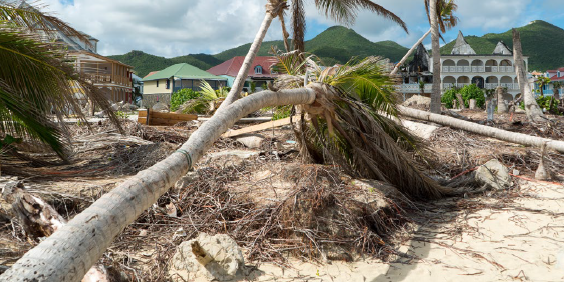Controlling climate change for human health
The impact of climate change on global weather systems is disproportionately affecting small island developing states. Executive director of the Caribbean Public Health Agency C James Hospedales outlines the threats to health and well-being
The world is becoming a dirtier and hotter place. The heat is driven by climate change due to human-made emissions of greenhouse gases.
With warming comes more hot days and nights, and increased evaporation of water and precipitation, whether snow or rain. We face an epidemic of unprecedented extreme weather events – hurricanes, floods and droughts – while earthquakes, tsunamis and volcanic eruptions remain at similar levels as in the past.
Climate change affects health directly, for example from heat stress and floods, and indirectly through determinants such as air pollution, water quality and public health infrastructure. Health outcomes result from complex interrelationships between these variables, making the prediction of health outcomes difficult. Existing, precarious societal conditions can be tipped by climate events, as has happened in Venezuela, where drought and insufficient water for the hydroelectric system and dams contributed to the collapse of the electricity supply and spurred climate migration to nearby countries in Latin America and the Caribbean.
In 2017, two of the most devastating hurricanes afflicted the Caribbean. The strongest storm on record to exist in the open Atlantic region was Hurricane Irma; the first Category 5 hurricane ever to strike the Leeward Islands was followed two weeks later by Hurricane Maria, which struck Dominica.
Hurricane Maria caused extreme damage to all sectors, including housing, hotel and tourism, ports, roads and bridges, and health facilities. It damaged health determinants, including water and sanitation systems and food distribution. It triggered looting and mental health breakdowns, and increased vulnerability to outbreaks of gastroenteritis and vector-borne diseases in the weeks afterwards. Data from Puerto Rico after Hurricane Maria showed as much as 50 times more excess deaths in the six months after the hurricane, compared to the death toll from the direct injuries and drowning.
The Caribbean Public Health Agency is advocating for attention and resources to address the threat of climate change, and to provide immediate response and recovery support along with the Caribbean Disaster and Emergency Management Agency.
CARPHA prepared the State of Public Health Report 2018: Climate Change and Health in the Caribbean, with input from the Caribbean Community Climate Change Center, the Caribbean Institute of Meteorology and Hydrology, and the University of the West Indies. Resources were mobilised from the European Union and others to combat Zika and other mosquito-borne diseases, by building national and regional capacity in all aspects of surveillance, prevention and control.
In October 2018 in Grenada, the Pan American Health Organization/World Health Organization hosted the Third Global Conference on Climate Change and Health, with a focus on small island developing states. The conference developed regional action plans to address health and climate change priorities in SIDS, under the four interlinked components of empowerment, evidence, implementation and resources. The Special Report on Global Warming of 1.5°C, released days before the conference, provided added impetus.
Climate change is now a standing agenda item at the meetings of the heads of government of the Caribbean Community. Yet the issues of both health and SIDS are under-represented at international negotiations on climate change and in funding proposals for mitigation and adaptation interventions, making resource allocation and mobilisation priority areas to be addressed in the region.
Globally, between 1966 and 2015, there were 737 climate-related disasters – storms, floods and droughts – in SIDS. Of these, 61% occurred in the Caribbean, as well as 93% of the deaths, 78% of all affected persons, and almost 90% of all damage costs.
The G20 can help by prioritising resource allocations for addressing climate change in SIDS as a litmus test of the international development community, and creating a G20/CARICOM climate and health 2030 initiative to achieve the health and environment Sustainable Development Goals.
Such an initiative would leverage existing investments and might support:
- A region-wide, sustained information campaign on climate and health that empowers people to be more resilient;
Innovation using traditional and new digital health and social media and technologies including drone transport for public health emergencies; - Research and integrated analysis of data on climate and health adaptation and mitigation;
- Programmes leveraging the built environment to increase alternative transport, including biking and walking, rapid mass transport, and urban greening;
- Fast track development of climate-resilient health facilities and schools such as the PAHO/WHO smart hospitals initiative.
The SIDS and the Caribbean are under huge threat, but they constitute an ecosystem of countries, institutions and partners with some capacity to achieve resilience.












